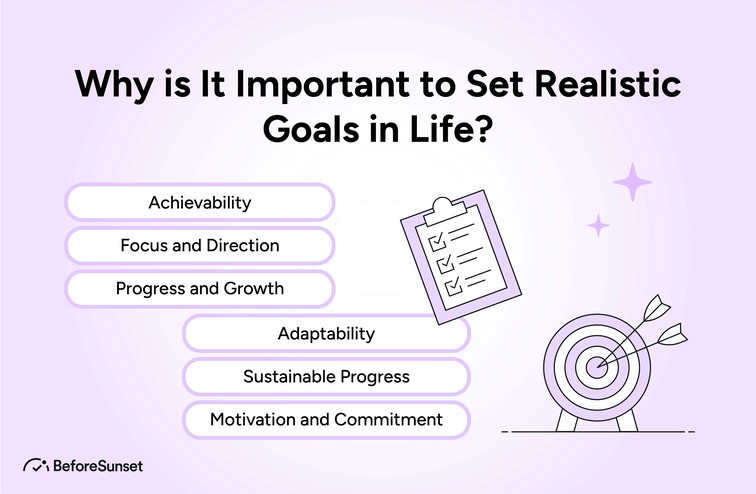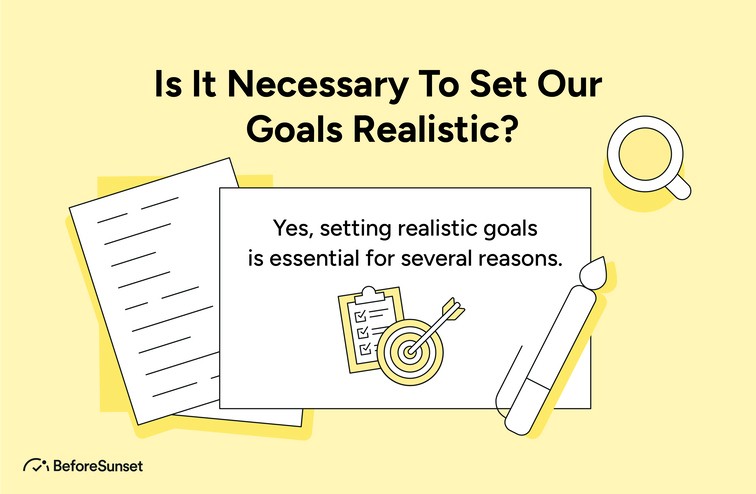Ensuring that your objectives are realistic is just as crucial to your personal and professional success as setting them. Realistic objectives are ones that are feasible given your resources, talents, and environment.
Setting realistic goals carries enormous importance and provides a strong basis for success, despite the allure of aiming high and having big dreams. This includes personal goals, long-term goals, professional goals, and also SMART goals. In this blog, we'll look at six key factors that make creating realistic objectives essential.
Understanding these factors can help you use realistic goal setting to improve motivation, keep your focus, make sustained progress, and, in the end, live a more contented and balanced life. Let's now explore the importance of setting realistic objectives as well as the advantages they provide for both our personal and professional activities.
Turn your list of goals into achievable goals.
What is a Realistic Goal?
A realistic goal is one that can be attained given the limits of a particular circumstance. Ultimate goals are reachable and possible to complete with reasonable work, action plan and dedication.
Take into account the following factors to decide whether a goal is realistic:
Clarity: Specify what you hope to accomplish. Goals that are unclear or imprecise make it challenging to gauge development and assess success.
Relevance: Make sure the aim is consistent with your overarching goals, beliefs, and aspirations. It should have significance and meaning for you.
Feasibility: Consider the time, effort, and resources needed to achieve the objective. Check to see if you have the resources—tools, information, and support—you need.
Time-bound: Define a deadline for completing the task. This encourages you to act by fostering a sense of urgency.
Flexibility: Take into account unexpected roadblocks or unanticipated situations that may occur. Create some wiggle room in your goal-setting process so you may change as necessary.
Creating career goals that take you outside of your comfort zone but yet creating achievable goals that are within your grasp is crucial. If unrealistic goals are repeatedly unachievable, they can cause irritation, demotivation, and a sense of failure.
Realistic objectives, on the other hand, give a sense of achievement and advancement that can motivate more growth and development. The goals regardless of the time frame can help you in your professional life immensely. As long as the current goals are not unattainable goals.
Why is It Important to Set Realistic Goals in Life?
Goal-setting is crucial for both personal and professional growth because it gives you a clear path to success. But not all objectives are created equal.
Setting achievable objectives that complement our resources and talents is essential. Realistic objectives act as benchmarks that keep us on track, inspired, and dedicated to our desires.
They offer a strong basis for development, permit flexibility, and contribute to long-term advancement in several facets of life. This section will discuss the significance of creating attainable objectives and how they might improve our life.
We may improve our chances of success, feel fulfilled, and travel with greater clarity and purpose on the path to personal and professional satisfaction if we appreciate the benefits of setting realistic goals.
1. Achievability
Achievability is the probability or viability of achieving a goal. When defining objectives, it's crucial to think about whether they can be achieved given the current situation's resources, abilities, time constraints, and other factors. You can achieve an attainable goal if you put up a decent amount of work and dedication.
2. Focus and Direction
Setting realistic objectives has several advantages, including direction and focus. Your efforts and energy are directed in a certain way when you have definite, realistic goals.
They provide you with a feeling of direction and assist you in setting priorities for your tasks, enabling you to stay concentrated on what is most important. You can avoid distractions and direct your time, money, and attention to tasks that advance your goals when you have goals in place.
This clarity and avoidance of aimless roaming allow you to make progress and advance with intention. Goals give you a feeling of direction, function as a road map to follow, and guarantee that your activities lead to the outcomes you want. You may utilize your efforts more effectively and go closer to realizing your goals if you have a clear focus and direction.
3. Progress and Growth
Setting and pursuing realistic objectives is inherently a process of growth and progress. Setting realistic goals helps you build a structure for development and progress over time. Every step forward and every goal reached indicates development.
This development gives you a sense of achievement and advances you closer to your objectives. Your knowledge, talents, and skills grow as you consistently work toward your goals. It enables you to go past your comfort zone, gain wisdom from mistakes, and cultivate fortitude in the face of difficulties.
Realistic objectives provide you the chance to extend yourself, face challenges, and develop into a better version of yourself, which is essential for progress and growth. The path you choose to reach your objectives serves as a catalyst for both your personal and professional progress, encouraging a sense of fulfillment along the way.

4. Motivation and Commitment
Setting realistic goals results in important components such as dedication and motivation. Your goals become potent motivators when they are reachable and complement your aptitudes. Setting realistic objectives gives you a focus to work for and gives you a sense of purpose and commitment. They motivate you to work harder and stick with your goals even in the face of challenges or disappointments.
You can see the road ahead and comprehend the actions needed to get there by setting realistic goals. Your motivation is stoked by this clarity because it gives you a concrete picture of success. Your motivation grows as you see progress and achieve minor successes along the road, generating a positive feedback loop.
Furthermore, creating realistic goals naturally results in commitment. Setting realistic goals encourages you to devote your time and commitment in the process of achieving them. As you have faith in the viability of your goals, you are more inclined to invest the required time, energy, and resources. This dedication acts as a motivating factor that pushes you on despite difficulties.
Commitment and motivation are mutually reinforcing and related. Realistic objectives may actually inspire you, which will strengthen your perseverance and deepen your devotion. This combination strengthens your resolve, assisting you in overcoming challenges, keeping your attention on the present, and being resilient as you work toward realizing your objectives.
5. Adaptability
Realistic goal-setting and pursuit depend heavily on adaptability. Because life is dynamic and frequently unpredictable, things might develop unexpectedly. To be flexible and adaptable in the face of these changes, realistic goals must be set.
Setting realistic, attainable objectives makes it simpler to make the necessary changes to your plans without getting disappointed or defeated. As circumstances change, you may evaluate and reevaluate your goals, making adjustments as necessary to keep on course. Your goals will stay relevant and attainable thanks to your capacity to adapt, even in the face of unforeseen difficulties or changes in priorities.
Additionally, adaptability encourages resilience and problem-solving abilities. Being adaptive enables you to keep moving forward when you experience challenges or setbacks by allowing you to identify alternate paths or answers. It challenges you to use your imagination, consider fresh options, and modify your plans as necessary to get over any obstacles that may appear.
Additionally, being flexible in your goal-setting empowers you to grab any chances that may arise along the road. You may increase your chances of success by taking advantage of unanticipated situations or fresh knowledge as long as you stay flexible in your thinking and open to change.
6. Sustainable Progress
Continuously moving forward with balance and awareness toward worthwhile objectives is what is meant by sustainable progress. Setting achievable objectives that take into account one's resources, skills, and general wellbeing is required.
Sustainable advancement enables continuous and long-lasting development by concentrating on incremental gains and upholding a consistent effort. It places a focus on flexibility to deal with obstacles and grasp chances along the route.
Importantly, sustainable growth places a high priority on self-care, ensuring that goal-setting and general well-being are balanced in a healthy way. People may achieve continual success, fulfillment, and long-term success in many facets of life by adopting sustainable advancement.

Is It Necessary To Set Our Goals Realistic?
Yes, setting realistic goals is typically important. Realistic objectives are ones that, taking into account your present resources, talents, and circumstances, are both reachable and attainable within a certain timeframe. Here are a few explanations on why it's crucial to establish realistic goals:
Motivation and Confidence: Achievable objectives give you a sense of motivation to strive toward them. You're more likely to stay motivated and keep a good outlook when your goals are attainable. Smaller victories along the road might give you more confidence and help you get closer to your ultimate goals.
Strategic Planning: Setting realistic goals enables efficient planning and strategy development. When your goals are doable, you can make a clear road map and determine the resources and procedures needed to get there. Your chances of success increase as a result of better time, effort, and resource allocation.
Avoiding irritation and Disappointment: Setting unreasonable objectives that are repeatedly unreachable might cause irritation and disappointment. Your motivation and general well-being may suffer as a result. By establishing acceptable expectations, realistic objectives, on the other hand, assist you in maintaining a better mentality.
Sustainable Progress: Realistic objectives provide you the ability to achieve sustained improvement over time. You may slowly work toward them and make little changes along the way by establishing attainable goals. This enables you to keep a steady pace and gather momentum, which may result in long-term success.
What Can Happen If You Set A Goal That Is Not Realistic?
Unrealistic goals can have a negative impact on your motivation, development, and general wellbeing. You may frequently encounter challenges and setbacks that make it tough to advance meaningfully when your goals are unreachable. Frustration, disappointment, and a sense of failure may result from this.
Your confidence and self-esteem may suffer as a result of frequently falling short of unreasonable standards, which will make it more difficult to stay motivated and continue.
Unrealistic goals can also lead to poor resource allocation and time management since you may spend your time and energy chasing impractical ambitions rather than more realistic and fruitful pursuits. Setting objectives that push your limits while remaining realistic is crucial for making consistent improvement and cultivating a better mentality.

What Is An Example of A Realistic Goal?
Depending on the conditions, a realistic aim may change, however the following is an illustration: Suppose you wish to increase your level of physical fitness. A reasonable objective may be to finish a 5-kilometer (3.1-mile) run in three months.
This objective takes into account your present level of fitness, your available training time, and the gradual nature of endurance growth. The SMART acronym stands for "specific, measurable, achievable, relevant, and time-bound." You may make a training schedule that contains rest days, progressively increases your running mileage, and takes into account any other obligations you might have.
By setting a realistic objective, you may make adjustments to your training as necessary, make consistent improvement, challenge yourself, and achieve your goal in a fair amount of time.
Why Do We Set Unrealistic Goals?
People may create improbable objectives for a variety of reasons, including:
Overconfidence: People occasionally place unrealistically high expectations on their skills, time, and resources, which causes them to set lofty objectives. This overconfidence may result from a sense of self-worth or a desire to push oneself, but it may also ignore real-world constraints.
Lack of Knowledge: Lack of precise knowledge or comprehension of the work or target can also lead to setting unrealistic expectations. It's simple to create objectives that are far from attainable without having a thorough grasp of the necessities, limitations, or essential tasks involved.
External Influence: People may establish improbable objectives as a result of external influences like peer pressure or social expectations. This could be brought on by social comparison, achievement standards, or a desire to win others' favor or admiration. These outside factors may cause people to have ambitions that are unreasonable given their circumstances or ability.
Desire for Rapid Results: In our fast-paced environment, there is frequently a demand for immediate and spectacular outcomes. This may cause people to establish unattainable objectives in the hopes of quick achievement or change. Though it's normal to want results quickly, it's crucial to strike a balance between this desire and a realistic assessment of what can be accomplished in a given amount of time.
Lack of Prior Experience or Planning: People who lack past experience or a well-thought-out strategy may set unreasonable ambitions. Setting impossible objectives is simpler when one is unsure of the procedures, materials, or amount of time needed.

What Does It Mean To Make Your Goals Realistic?
Setting targets that are reachable and attainable within your existing circumstances, resources, and talents is a key component of making your goals realistic. Realistic objectives are founded on a comprehensive comprehension of your advantages, constraints, and potential outside influences.
They consider things like time, expertise, support resources, and probable difficulties. Realistic objectives enable you to assess your progress and make required modifications along the road since they are precise, quantifiable, and have a defined timetable.
By focusing your efforts on objectives that are within your grasp and ensuring that your goals are realistic, you position yourself for success and are encouraged to make steady progress and have a good outlook.
Why Should Students Set Realistic Goals?
For a number of reasons, students should set reasonable objectives. First of all, setting realistic goals helps students prioritize their work and manage their time and resources wisely by providing clarity and direction.
Students may plan and strategy effectively by identifying reasonable goals and then developing a roadmap outlining the essential actions to reaching those goals. Setting realistic objectives helps people feel motivated and confident.
By achieving modest goals, students may make steady progress, which increases their confidence and motivates them to keep moving forward. Furthermore, setting achievable goals helps students maintain a good balance between aspiration and reality, keeping them from feeling overextended or discouraged. Students can maintain a sustainable rate of advancement, experience personal growth, and improve their general academic performance by setting attainable goals.

How Do You Help Students Set Realistic Goals?
Firstly, I urge students to think about their strengths, shortcomings, and goals in order to clearly identify their current skills and potential growth areas. Students can develop objectives that are compatible with their talents by taking into account their present situation and the resources at their disposal.
I also stress the significance of creating SMART goals—specific, measurable, attainable, relevant, and time-bound. Students can assess their progress and maintain motivation by dividing bigger goals down into smaller, more doable activities. I advise students to ask for criticism from mentors, professors, or peers in order to gain understanding and adjust their objectives.
In addition, I support objective assessment and modification on a regular basis to reflect new circumstances or personal development. I want to help students create attainable objectives that will promote both their academic performance and personal growth by offering advice on these topics.
How to Set Realistic Goals?
Realistic goal-setting requires careful consideration and a methodical approach. The following actions will assist you in making sensible goals:
Reflect on your values and aspirations: Consider your values, interests, and long-term goals as a starting point for your reflection on your ideals and ambitions. Consider your priorities in life and the things you wish to do in each one.
Define specific and measurable goals: By making your goals clear and measurable, you can monitor your progress. Establish criteria to measure progress and clearly state what you intend to achieve.
Assess available resources and constraints: Consider the resources at your disposal, such as time, money, talents, and support. Also take into account any limitations. Consider any restrictions or limits that could have an effect on your goal-setting procedure.
Break down larger goals into smaller milestones: Larger goals should be broken down into smaller milestones if they are ambitious or long-term. This will make the goals easier to achieve. This enables a methodical approach, which reduces the size of the goals and heightens the sensation of progress made along the route.
Check your reality: Examine whether your objectives are feasible given your resources and situation right now. Being realistic with yourself can help you set objectives that are more manageable. Think about probable obstacles and make plans to overcome them.
Set a deadline: Decide when you want to accomplish your goals. This gives your efforts shape and helps instill a feeling of urgency. Make sure the schedule, however, provides for the required flexibility and is acceptable.
Seek accountability and encouragement: Tell a friend, family member, or mentor about your intentions. Having someone to hold you responsible for your actions and offer encouragement may greatly improve your chances of being dedicated and motivated.
Evaluate and adapt frequently: Periodically evaluate your objectives and gauge your success. As circumstances or your perspective change, you should revise your goals accordingly. To keep your goals realistic, you must be adaptable.
Celebrate important anniversaries and accomplishments: Recognize and appreciate your progress. No matter how little, acknowledge the progress you have achieved toward your objectives. Celebrating achievements gives a sense of accomplishment and keeps motivation high.
Remember that achieving your objectives requires striking the correct mix between pushing yourself and making sure they are attainable. You may position yourself for success and make consistent progress in the direction of the achievement of your goals by adhering to these procedures and continuously modifying your objectives.
How Can BeforeSunset AI Help You Set Realistic Goals?
Setting realistic objectives can be made easier with the aid of BeforeSunset. First of all, it gives you the ability to specify precise goals and divide them into smaller, more doable tasks. BeforeSunset assists you in developing a realistic roadmap for reaching your goals by describing the essential actions and sub-goals. To properly plan your time and resources, it also enables you to define deadlines and assign priority.


